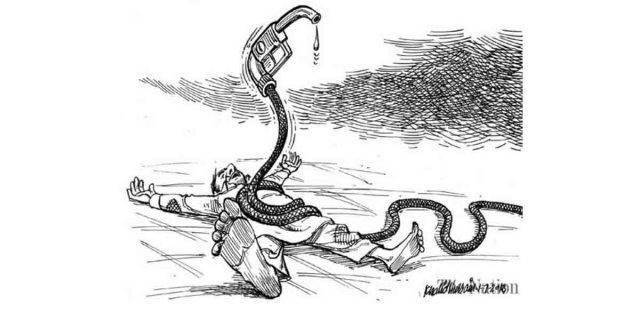News Analysis |
The Federation of Pakistan Chambers of Commerce and Industry (FPCCI)’s President Ghazanfar Bilour has termed the most recent surge in petroleum prices as unacceptable for its consequences on the livelihoods of poorer classes. In statements made to a delegation of traders on Sunday, Bilour said that the ascending revisal in petrol prices will damage consumerism as well as business. He added that in the interest of national prosperity this second revision in prices should be recalled immediately.
Movement of oil by road has gone unhindered as transporters capitalize on the price difference.
The government should eradicate poverty and not the poor through the frequent hike in petroleum prices, he demanded.
Bilour predicted more problems out of this move as the increasing price of fuel would propel the prices of other commodities upwards. An increasingly alienated working and lower middle class might turn towards crime as necessities and transportation including shipping and commuting become more costly. He also said that price of petrol has been increased by Rs. 7.54 per liter while the price of diesel has been increased by Rs. 14, and such unprecedented numbers would stoke inflation.
Read more: Hike in Petroleum product has put a question mark on targeted…
Somehow heeding his calls, the government will most likely absorb some of the impact imposed by price regulators as a good will departing gesture. An official said that such a move is possible since this would be the last price adjustment of the current government’s tenure.
Bilour lamented how the government overlooks taxation of elites but instead burdens the masses and penalizes the business community both of which have too much on their plate already. The caretaker government should not remain unconcerned to the plight of masses who have nothing to do with the bad policy decisions, he demanded.
However, this move is related to a broader global context of price hikes in petroleum that have been continuously occurring since the petrodollar was introduced in the mid-70s. In 2008 most developing countries underwent a food crisis as petroleum and consequently fertilizer prices increased.
The Organization of Petroleum Exporting Countries under dollar denominations have agreed to use their monopoly on the oil industry to lift output. In the tense 22nd of June meeting in Vienna, OPEC agreed to raise output by 1.8 million barrels to compensate for reduced supply from Iran and Venezuela. Crisis-stricken Venezuela is on a downhill course in production as the economy nosedives. Iran’s exports on the other hand were curbed with sanctions when President Trump revoked the Iran Nuclear deal.
China surpassed the US as the largest importer of Oil from OPEC countries and Russia-OPEC talks had previously advocated a price hike to deplete international inventories. The oil market was looking to balance out prices in June as increased prices would regulate itself towards increased output eventually.
Oil prices are too high, OPEC is at it again. Not good!
— Donald J. Trump (@realDonaldTrump) June 13, 2018
Trump took to twitter to point the finger of blame at OPEC. But while production only dropped less than 1% the price range has increased from $40-50 in 2016 to $60-75 this year for various reasons. The US market and top oil companies like Haliburton and Brent Crude intend to manage that while citing increased prices to be as a consequence of reasons related to the tight labor market and acquisition of newer equipment.
An increasingly alienated working and lower middle class might turn towards crime as necessities and transportation including shipping and commuting become more costly.
While international markets may have to deal with OPEC prices and production monopoly, Pakistan’s burgeoning trade in smuggled Iranian oil is seen by many as a remedy. China and Russia as well as Central Asian countries have exploited the shift in US foreign policy to set up friendlier trade ties with neighboring Iran. Iranian oil clocked in at $4 billion in imports to Pakistan in 2012. While political turmoil and sanction has made the Iran-Pakistan pipeline a pipe dream this has not prevented illegal trade in oil between magnates of both countries.
Despite huge losses of about 7 billion Rupees per annum in tax revenue, the government was not taking interest to curb this illegal trade. International donors like World Bank and International Monetary Fund (IMF) have also warned government to stop illegal business in the interest of stake holders of this sector.
Read more: Price of petroleum to hit highest point in three years
While Iranian products are harmful for the engine of the vehicles, the only advantage of smuggled Iranian oil products is their low rates. With the current price hike, the prospects of bilateral oil trade between Iran and Pakistan might materialize. Until then smuggled Iranian petrol is getting a boost for being 35-40 Rupees cheaper than OPEC imported oil. Movement of oil by road has gone unhindered as transporters capitalize on the price difference.
Most Iranian oil finds its way to select pumping stations run by influential personalities in the government and as a result law enforcement agencies are reluctant in taking action against the illegal business.














